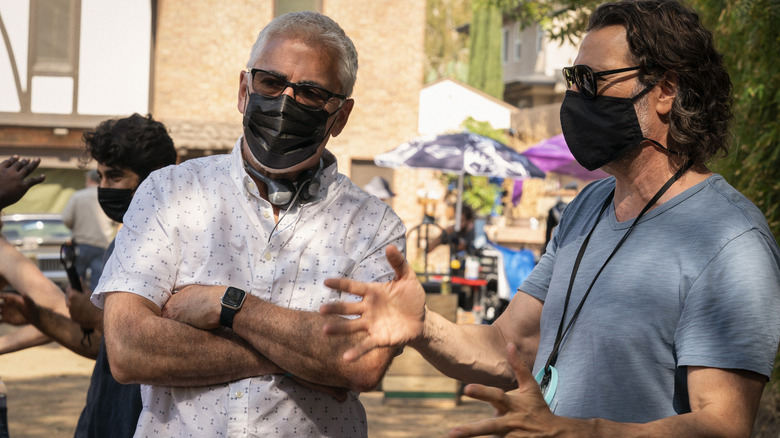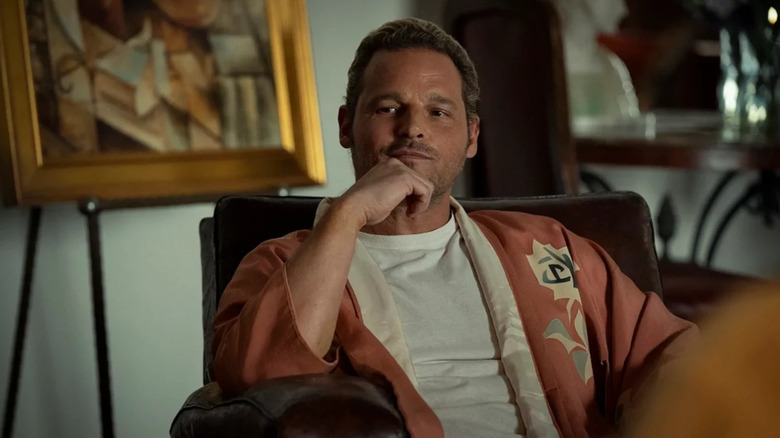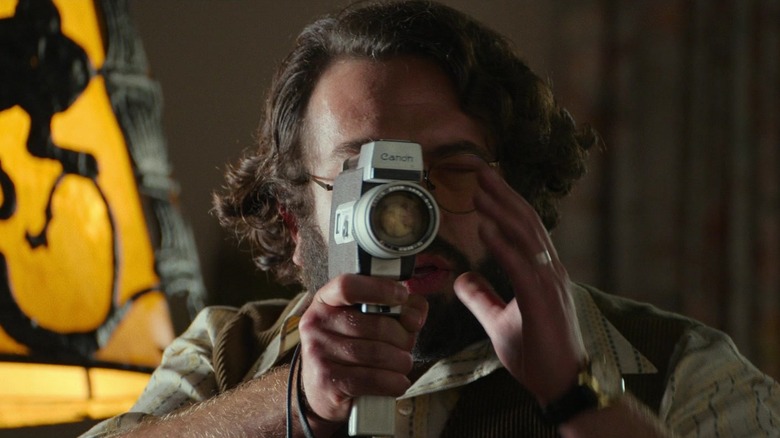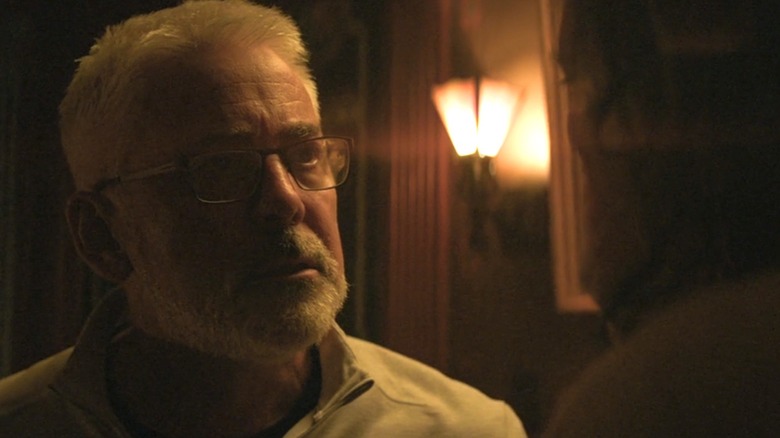The Offer Director Adam Arkin On Introducing Marlon Brando And Memories From Pig [Interview]
Director Adam Arkin has worked on some stellar shows throughout his career. The actor and filmmaker made his directorial debut in 1993 with "Northern Exposure," and three decades later, he's helmed acclaimed episodes of "The Americans," "Billions," "Fargo," "Justified," and "Succession," to name just a few. Now, he's behind four episodes of the new Paramount+ miniseries, "The Offer," which is about the making of "The Godfather."
Arkin directed this week's new chapter, "The Right Shade of Yellow." The director introduces one of the more larger-than-life characters in the show, Marlon Brando (Justin Chambers). Everyone in the room, including producer Al Ruddy (Miles Teller) and Francis Ford Coppola (Dan Fogler), is in awe. According to Arkin, that sense of awe was really there on the set as the actors watched Chambers transform into Brando.
Recently, Arkin took us behind-the-scenes of "The Right Shade of Yellow," told us about his experience on "The Offer," and recounted his remarkable experience working with Nicolas Cage on last year's "Pig."
'It was a delightful day working on those scenes'
Did you also find it surreal watching Matthew Goode as Robert Evans?
He did an unbelievable job of channeling that man. I was awestruck by how consummate he is as a performer. He manages to have it be such an accurate portrayal of Evans and somehow not make you feel like you're watching an imitation of him, either. It's a full 360 on the character. I love it. He's one of those brilliantly trained actors that I often associate with the English acting tradition. He's technically advanced as an actor and was able to drop it; in between takes, he'd suddenly be speaking with an English accent. You'd be like, "How is this possible?" Quite an amazing artist.
In episode 4, when you're shooting the scene with Brando and Evans, how do you best try to capture that moment as a director when it is just two actors at a table?
Well, in the case of those two actors, it didn't require a lot of extracurricular work on my part. I felt the best I could do was serve what they were already bringing in. They were both so keyed into who they were playing. Justin as well, with the huge task of playing Brando, his instincts about it were so great. The opportunities for the humor in the scene were revealing themselves in what they were doing.
Matthew's got a great moment in that scene where Brando's like, "What is this, a playground?" Matthew goes, "What? What? No." For me, with the two of them, it was primarily a matter of occasional tone control and making sure we were all on the same page, as far as where the drama and where the comedy lay. Their sensibilities were so strong and their knowledge of their own characters were strong enough that I didn't really have to do a lot of massaging in that scene.
Brando has a grand entrance in "The Right Shade of Yellow." How'd you decide to first present him?
There were little clues given in the script at that point, just in terms of what he was wearing. His hair's in a ponytail, he's in a kimono. Especially once we found the location, some of that was informed by what the location itself revealed. Knowing that they were going to be sitting in that main living room area, I saw that stairwell. It was such a beautiful staircase, and I thought that it would provide a great visual cue for the entrance of somebody [who], even at that point, was considered such a legend and so larger than life.
The fact that the living room had that little stairway going down into, it felt like a great proscenium presentation for the character. I definitely wanted to give his entrance a weight and a sense of momentousness that the location and the actor both provided when we were there. I kept telling Justin, who was understandably — he was enthusiastic, certainly, about playing the role, but also was initially finding it daunting. I kept telling him, "A big part of this is going to be solved by feeling the reactions of people around you when you arrive. That's going to define this guy's power for you. You don't have to worry about that."
Brando, I don't think he really worried about what kind of an impression he was making. My sense whenever I watched Brando in interview circumstances was that he enjoyed playing with the level of awe that people around had and enjoyed sort of both tweaking that and tearing it down simultaneously. I knew based on what I saw Justin preparing for Brando, that the only missing ingredient was going to be feeling the effect he was having on the people around him. The whole company of actors in that scene provided him with a great energy in that respect. They were both playing their roles, but also were so taken with what Justin was doing, that in Juno [Temple]'s case, she was genuinely kind of awestruck. It was hard to know where the character's reaction ended and where her own began. It was a delightful day working on those scenes.
'Your job is to let something breathe'
The advice you gave Justin that those nerves would go away once he was in the room and feeding off what the other actors would give him, has that been your experience as both an actor and director?
It's definitely been my experience when I've had to play a role of a character that carried a certain power with them. It's hard, I think sometimes as an actor, to fully feel that kind of power and groundedness in a vacuum. I think it requires at a certain point for the finishing touch, to be aware of the effect that your character is having on other characters in the story. If everybody else is doing their job, when you're playing a person who's in a position of real power, it can only help strengthen that feeling if the reactions that you're getting from everyone are reinforcing those aspects of your character.
Like you said, there's the power and the grounded side you want to show. Visually, how do you try to do that with figures as towering as Brando and Evans?
It boils down to, as I get older, more and more of the process of anything creative depends a huge amount on, I think, staying present and being aware and open eyed to what you see manifesting in front of you. When you have a group of people as good as this company of actors and material as great as what Michael Tolkin and Nikki Toscano and Russell Rothberg provided on this project, first and foremost, your job is to let something breathe and let the actors have a sense of safety and freedom to explore and expound on what they're doing. When that starts really flowing, the ways of modulating that, or even blocking it, start revealing themselves. It becomes a question of being centered and present enough to recognize those opportunities as they're unfolding.
Earlier on in my directing career, there was a huge amount of emphasis on the pre-planning. God knows, prep is a very important part of anyone's process, but there's also that aspect of prep that is making yourself ready to take advantage of the happy accidents that end up occurring inevitably. Sometimes those things of the greatest value are the ones that are a process of moment to moment discovery in the filming of stuff. I think this was a group of actors that liked working that way, and it's very much a way I like to work.
How about following director Dexter Fletcher's work and how he established the show?
I wasn't making any kind of an academic study out of that process. I certainly looked at the work that Dexter was doing, and I had access to the dailies while he was filming. Obviously, because I was in prep when Dexter was actually filming, there was really no cut footage to look at that point. There were two DPs on the project, but the DP in the earlier part of the series, Sal Totino, between he and Dexter, they established very quickly a pretty specific visual vocabulary for the show. It had a kind of classical sense to it.
I think that Sal was trying to honor the visual style even of the original film in certain ways, and certainly in the way that he was lighting it. And so, that was really more than a kind of external study of what they were doing. It was just through osmosis, absorbing the vibe of it, looking at it and knowing that Sal was going to be continuing on and that I'd be working with him, so that sense of visual continuity would exist. That was very helpful.
Both Sal and the DP that took over for him, Elie Smolkin, they both had a very strong sense of wanting to let, I think, the original film, "The Godfather" — not be imitative of that, but certainly inform an aspect of the shooting style. For example, it was just a slightly more classical style than may exist in a lot of contemporary stuff. There's virtually no handheld work in the show. It had almost a stately feature film quality to the look of it.
Did you want to pay homage to [cinematographer] Gordon Willis at all and let darkness and shadows have prominence?
The use of shadow was something that both Sal and Elie were, I think, encouraged to embrace. There are a lot of shows I've worked on where there's lip service paid to, "We want it to look different, and we want the darks to really be dark. We don't want to necessarily have two eyes in all of our closeups and have everything over lit." Inevitably, even in the best of intentions, sometimes those commitments get whittled down a little bit over time and things start being brought more towards a centrist approach to the visuals on shows. On "The Offer," they were really allowed to continue scenes that took place in shadow, scenes had any ominous aspect to it or moody aspect to it were allowed to read that way and feel that way visually.
'That whole experience was a complete gift, and a completely unexpected gift'
You have directed some very cinematic television. Which shows have you felt more opportunities to be more expressive with the camera?
There've been a lot of shows that have allowed for a visual exploration and freedom. It doesn't always necessarily translate to something that is necessarily conjuring a specific feature, per se. But the shows that have been kind of visually the most freeing for me as a director were, I would say, "Fargo" had a very specific visual template to it. I think there was a conscious desire to at least evoke aspects of the Coen brothers in the way that the series was approached. A lot of reliance on clean singles with wide angle lenses, as opposed to more traditional overs when you're doing coverage. A color palette that was, I think, evocative of Roger Deakins, at least in a nod to him.
"Succession" has a very specific visual style, the use of multiple cameras that are turned loose to pick up details and allow things to be played almost in a more improvisational and spontaneous feel as opposed to more traditional coverage. And then on "Get Shorty," which I really got to have more of a hand in creating the visual vocabulary for it, there was a lot of enjoyment in that, in terms of giving the show a specific visual fingerprint.
For me, "Pig" was the best movie of last year.
Oh, I'm so happy you felt that way.
What special memories do you have from that experience?
That whole experience was a complete gift, and a completely unexpected gift. There's an aspect to it that has a kind of dreamlike quality for me because it happened extraordinarily quickly. I received that script, and it was sent to me with the understanding ... I'm bringing it up not as a boast, but I'm bringing it up because it was such an unusual set of circumstances for me. Those times when I get the chance to be considered for a feature film, it almost inevitably involves putting myself on tape or meeting with the director and auditioning in one way or another. "Pig" came to me as a request to read with the understanding that there was an offer before I even read it. My manager said, "Please read it quickly because they need an answer fairly quickly." They were in a little bit of a bind. My understanding is that somebody else had been originally set for the role and dropped out. So I read the script, I was very taken with it, and also obviously taken with the role. I immediately said, "Yeah, I'm interested. I would love to do this."
Literally, like the next day, on a plane, up to Portland, where I met everybody, was welcomed into the production and taken out to dinner by the producer to one of the restaurants that was providing technical supervision on the cooking part of the film and wardrobe meetings. Within 48 hours of having read the script, I was on camera. All of my work was done in the last three days of production. My wife came up and joined me up in Portland. We were there for the wrap party for the film. Before I knew it, the movie was wrapped, and I was back in L.A.
The chronology of receiving the script and coming back home, having completed the work, all happened in about a calendar week. It was very fast. It was very inclusive. People were incredibly welcoming and warm. I felt completely at home and relaxed, and probably more relaxed for the fact that I didn't have time to really overthink anything. I just had to go with my gut and pick up on the vibe of what I was entering, because they had all been working together for five or six weeks at that point. Or in some cases, as far as pre-production is concerned, for months and months, they've been working. It was such a great joy.
I also have to be honest, though, it was one of those films that in spite of its obvious merits, it was one of those projects that, and especially because the speed which it all happened, I had no idea what was going to happen to it from that point on. Sometimes films that are very deserving get made but don't get distributed, or you don't hear about them after the completion of filming. To see the reception that it got and the attention that it got was just the icing on the cake. It was such a gift of an experience on every level. It's a gift that keeps on giving because so many people keep referencing it as something that moved them.
I got a call from a very dear friend of mine yesterday, who's a wonderful actor, John Carrol Lynch, wonderful actor, and a director too, directed his wonderful film, "Lucky." He just called me out of the blue and just blew my mind with how affected he'd been by the film. So it was really just a lovely, unexpected gift across the board. Working with Nicolas Cage was, I was just so impressed by his commitment and his generosity as an actor. Alex [Wolff], as well. They had a very specific bond by the time I came into that production for obvious reasons. It's the kind of thing that sometimes a newcomer into that environment can be viewed as an interloper, but I was never made to feel that way. I was sort of welcomed by everybody with open arms. Director Michael Sarnoski is obviously somebody we're going to be hearing a lot from.
"The Offer" is now streaming on Paramount+.



